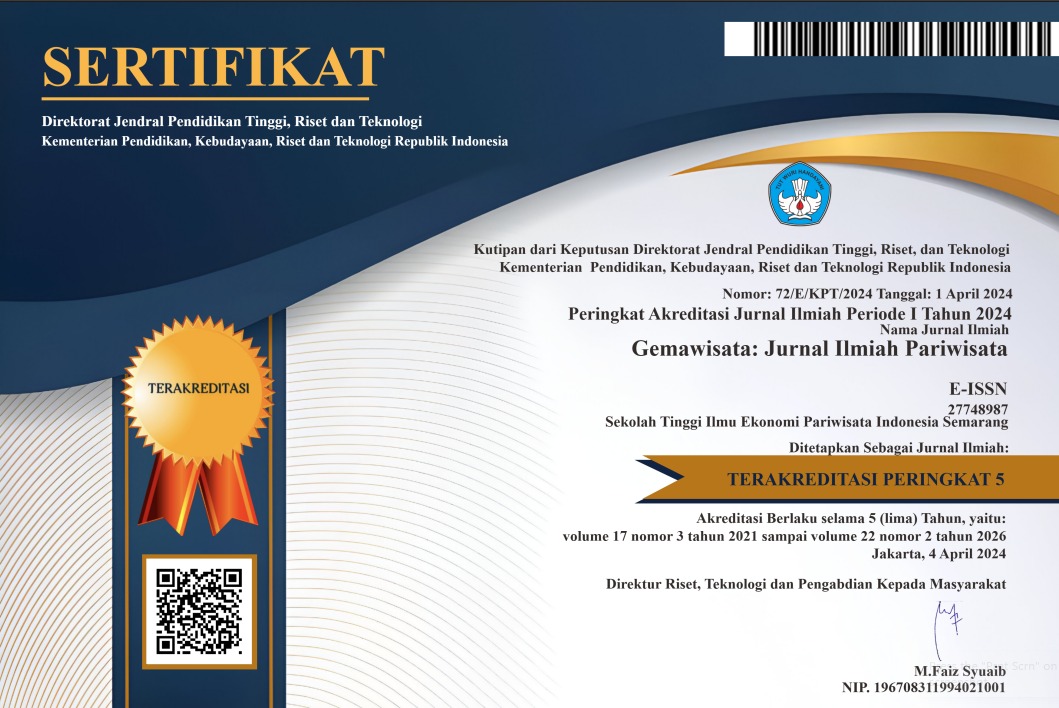Implementasi dan Perkembangan Halal Tourism pada Destinasi Pariwisata Lombok
DOI:
https://doi.org/10.56910/gemawisata.v21i1.451Keywords:
Destination, Halal Tourism, TourismAbstract
Lombok has long been touted as a "new Bali" tourism destination. Along with the changing times, changes in tourist trends also develop and begin to recognize various new types of tourism. Lombok has a uniqueness that is thick with Islamic nuances. Therefore, Lombok applies a type of Muslim-friendly tourism / halal tourism. Muslim-friendly tourism types have been implemented indirectly by tourism actors in Lombok. Visits to various tourism destinations in Lombok were taken as samples representing the city. With qualitative descriptive research methods, the author wants to present observations supported by exposure to documentation and interviews. The author also bases research on a theory tested in reality, especially in Lombok tourism destinations. Based on the study results, several Lombok tourism destinations still need help implementing Muslim-friendly tourism. Problems are known both from destination location factors and market segmentation factors. However, some locations have been found to have long-term development opportunities that make it possible to implement Muslim-friendly tourism as a whole through certain efforts. The fulfillment of the minimum requirements for Muslim-friendly tourism does not have a coercive nature but has the opportunity to influence tourists' interest in visiting. Therefore, the Lombok government, with Muslim-friendly tourism branding together with stakeholders, maintains and improves the quality of tourism services for the sustainability of Lombok's tourism economy.
References
Berutu, F. (2023). Strategi pengembangan destinasi wisata Tangga Seribu Delleng Sindeka sebagai daya tarik wisata Kabupaten Pakpak Bharat, Sumatera Utara. Jurnal Manajemen Perhotelan dan Pariwisata, 6(1), 132-140.
Badan Pusat Statistik. (2023). Tingkat kunjungan wisatawan. Nusa Tenggara Barat.
Brown, & Stange. (2015). Tourism destination management. Washington University.
Diwanti, D. P., & Wijayanto, S. A. (2023). Analisis literasi wisata halal destinasi Lombok Nusa Tenggara Barat: Studi kasus pada mahasiswa perguruan tinggi di Kota Mataram. Jurnal Ilmiah Ekonomi Islam, 9(2), 2099-2104. https://doi.org/10.29040/jiei.v9i2.8716
Harahap, M. G., Tarmizi, R., Sholihah, N. A., Adhianata, H., Maulidizen, A., Sirojudin, H. A., ... & Supriati, R. (2023). Industri halal di Indonesia. Sada Kurnia Pustaka.
Haryanegara, M. E. A., Akbar, M. A. I., & Novianti, E. (2021). Peran label pariwisata halal sebagai daya tarik wisata budaya di Lombok, Nusa Tenggara Barat. Tornare: Journal of Sustainable and Research, 3(1), 35-39.
Irfan, P., & Apriani, A. (2017). Analisa strategi pengembangan e-tourism sebagai promosi pariwisata di Pulau Lombok. ILKOM Jurnal Ilmiah, 9(3), 325-330. https://doi.org/10.33096/ilkom.v9i3.164.325-330
Luturlean, B. S., & Se, M. M. (2019). Strategi bisnis pariwisata. Humaniora.
Moleong, L. J. (2006). Metodelogi penelitian kualitatif. Bandung: Remaja Rosdakarya.
Putra, M. F. S., & Tucunan, K. P. (2021). The concept of halal tourism and the fulfillment of Muslim tourist needs in halal tourism. Halal Research Journal, 1(2), 56-62.
Riani, N. (2021). Pariwisata adalah pisau bermata dua. Jurnal Inovasi Penelitian, 2(5), 1469-1474. https://doi.org/10.47492/jip.v2i5.923
Soleha, S. (2023). Potensi pariwisata halal di Indonesia dalam menarik wisatawan internasional. Ar Rehla: Journal of Islamic Tourism, Halal Food, Islamic Travelling, and Creative Economy, 3(2), 134-143. https://doi.org/10.21274/ar-rehla.v3i2.8316
Subarkah, A. (2018). Diplomasi pariwisata halal Nusa Tenggara Barat. Intermestic: Journal of International Studies, 2(2), 188-203. https://doi.org/10.24198/intermestic.v2n2.6
Sugiyono. (2018). Metode penelitian kuantitatif, kualitatif, dan R&D. Bandung: Alfabeta.
Srisusilawati, P., Kusuma, G. P. E., Budi, H., Haryanto, E., Nugroho, H., Satmoko, N. D., ... & Ardiansyah, I. (2022). Manajemen pariwisata. Penerbit Widina.
Syahrial, M. (2019). Manajemen pariwisata halal. Jakad Media Publishing.
Syarawie, M. M. (2023, September 14). Ratusan investor dalam dan luar negeri bakal masuk Kota Balikpapan. Kabar Kalimantan. https://kalimantan.bisnis.com/read/20230914/407/1694974/ratusan-investor-dalam-dan-luar-negeri-bakal-masuk-kota-balikpapan
Unit, C. (2020, September 27). Penyusunan dokumen IPRO-Investment Project Ready to Offer 5 destinasi pariwisata super prioritas. DESMA I Sustainable Tourism and Conservation. https://www.desmacenter.com/detail-36-penyusunan-dokumen-iproinvestment-project-ready-to-offer-5-destinasi-pariwisata-super-prioritas-
Wahyulina, S., Darwini, S., Retnowati, W., & Oktaryani, S. (2018). Persepsi wisatawan Muslim terhadap sarana penunjang wisata halal di kawasan Desa Sembalun Lawang Lombok Timur. JMM Unram-Master of Management Journal, 7(1), 32-42. https://doi.org/10.29303/jmm.v7i1.400
Zaini, M. (2021). Pengembangan pariwisata halal berbasis masyarakat untuk meningkatkan kesejahteraan: Studi kasus pada Desa Wisata Sembalun Lawang, Kecamatan Sembalun, Kabupaten Lombok Timur, Nusa Tenggara Barat. MUSLIMPRENEUR: Jurnal Ekonomi dan Kajian Keislaman, 1(2), 94-102.


1_(1).jpg)






